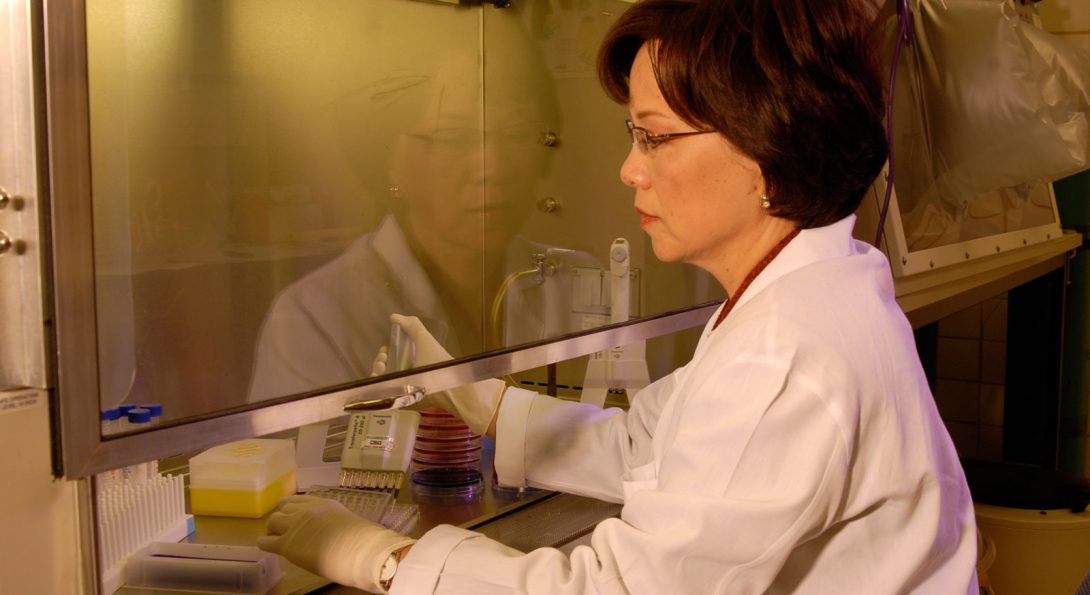UIC Dentistry Research Studies Effects of Drinking Milk After Sugary Snack Consumption

Dr. Christine Wu, Professor, Pediatric Dentistry, was awarded a research grant in 2015 for her study, “Consumption of milk after sugar snacks reduces dental plaque acid production and benefits oral health in children.” She was one of seven researchers awarded funding, out of 80 who competed to be funded by the National Dairy Council (NDC) for two years.
This latest study builds upon previous functional foods and products research Dr. Wu’s lab has conduced, which focuses on the exploration and identification of plant-derived anti-plaque and anti-biofilm compounds against oral pathogens. In recent years, her laboratory has been engaged in clinical and translational studies to evaluate the oral health benefits of specific foods and beverages, especially dietary plant polyphenols (catechins and proanthocynandins) including teas, raisins, cranberries and dried plums.
![]() Video: Functional Foods for Good Oral Health
Video: Functional Foods for Good Oral Health
The objective of the NDC-funded study is to examine whether low-fat milk, 100% apple juice, or tap water affect dental plaque acidity in seven-to-11 year-old children “after a sugary challenge by a dry, ready-to-eat breakfast cereal,” Dr. Wu said. “The protective effect of milk consumption in reducing dental plaque acidity will be compared with effects after juice or water consumption.”
The study will generate awareness that compared to water or the numerous sugar-added fruit juices available on the market, milk may be “the healthy beverage of choice to prevent tooth decay, especially after consumption of sugary snacks or desserts,” Dr. Wu said. “We want to raise public awareness that milk, besides its caries protective effect, when sequenced properly between and especially after sugary snacks, can reduce caries risk and benefit oral health, especially in children. We anticipate that the dairy industry will serve as a front runner in leading other beverage industries to promote healthy and functional beverages for oral health.”

“For generations, dairy farmers and the dairy industry have been committed to promoting children’s health,” Dr. Wu explained. “Drinking milk has been accepted as an excellent habit for nutrition and, in particular, for the health of bone and teeth.” She also noted that milk has anticariogenic properties and that its benefits to oral health are “ultimately associated with a person’s systemic health and well-being.”
UIC Research Labs Studying Functional Foods
For more than two decades, Dr. Wu’s lab has focused on the exploration and identification of plant-derived anti-plaque and anti-biofilm compounds against oral pathogens. In recent years, her laboratory has been engaged in clinical and translational studies to evaluate the oral health benefits of specific foods and beverages, especially dietary plant polyphenols (catechins and proanthocynandins) including teas, raisins, cranberries and dried plums. She is an advocate of and promotes “functional foods/beverages for oral health,” Dr. Wu concluded.
Dental plaque bacteria on tooth surfaces ferment dietary sugars and carbohydrates to produce acids that can cause demineralization of the enamel surface, thus leading to tooth decay. The usual dietary advice for caries prevention is to limit frequent intake of sugars. A recent study published by Dr. Wu’s research team showed that, in adults, the cariogenic potential of sugars may be modified by the ingestion of non-cariogenic foods such as milk. “However, it remains unknown whether a similar situation exists in children, who frequently consume sugary snacks/juices and lack awareness of proper follow-up oral hygiene measures,” she noted.
Dr. Wu cautioned that while drinking milk may offer caries protection, ideally tooth brushing and maintaining good oral hygiene are still the best way of reducing dental plaque.
Pediatric Dentistry resident Htet Bo will participate in Dr. Wu’s latest study.
Dr. Wu also thanked Dr. Marcio da Fonseca, Head, Pediatric Dentistry, for his support of her research effort.
More on UIC College of Dentistry Research
More on UIC College of Dentistry Pediatric Dentistry